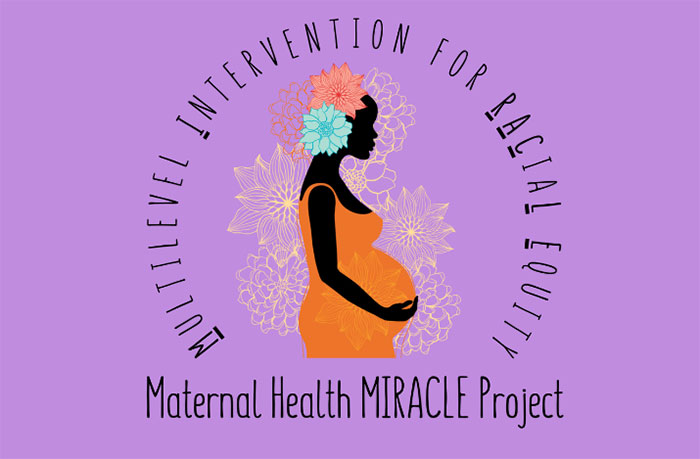 Jennifer Johnson and Cris Meghea, Michigan State University
Jennifer Johnson and Cris Meghea, Michigan State University
Rationale. US maternal mortality rates are the highest among high-income countries. These challenges disproportionately affect African American (AA) women. AA women are three to four times more likely to die of pregnancy related complications than non-Hispanic white (NHW) women and have twice the rates of severe maternal morbidity (“unexpected outcomes of labor and delivery that result in significant short- or long-term consequences to a woman’s health”). Inequities occur at many levels. These include the system level, in which health systems serving AA women are less likely to offer high-quality care, and quality initiatives that to do not directly target disparities often have little or no effect on disparities. At the provider/practice level, implicit and explicit biases and the structures and practices reflecting them contribute to inadequate quality of care for AA women, reduce the acceptability of treatment, and contribute to racial disparities in maternal morbidity and mortality. At the community level, in which the built environment and working multiple jobs while managing family obligations can make it difficult for AA women to access even enhanced prenatal and postnatal care (EPC) programs designed for them (such as Michigan’s Maternal-Infant Health Program and Healthy Start).
Goal. This project will implement a three-level intervention to address AA-NHW maternal morbidity and mortality disparities in two Michigan counties: Genesee County (which includes Flint) and Kent County (which includes Grand Rapids). Interventions at each level are evidence-based and were developed or co-developed by our partners in these counties, who include AA women residents and community leaders, EPC staff (including Community Health Workers), and physician/health system representatives.
System level (improving quality) intervention. We will implement community care patient safety bundles targeting maternal health disparities throughout the intervention counties. Community care is defined as care provided by outpatient, EPC, and community-based organizations. Kent County is the lead of 5 pilot communities in the national Alliance for Innovation on Maternal Health Community Care Initiative (AIM-CCI) to develop and implement non-hospital focused maternal safety bundles. The bundles provide care guidelines to address disparities in preventable maternal mortality and severe maternal morbidity. As part of this project, Genesee County will implement the bundles in partnership with Kent County, providing the first level of our multilevel intervention. Michigan State University will provide technical assistance on evidence-based implementation frameworks and strategies to aid effective implementation and sustainment in both counties.
Provider/practice level (improving acceptability) intervention. We will address provider and health system anti-racism training and problem-solving, and corresponding structures and practices and make this learning actionable using daylong experiential trainings. Trainings will include didactics, reflection, discussion, windshield tours, and brainstorming ways to tailor trainees’ settings to better hear, respect, and meet the needs of perinatal AA women. Training will include everyone from physicians to front desk staff and will take place in small groups (10-20). These anti-racism trainings/windshield tours were developed by Genesee County community partners, including Community-Based Organization Partners (a group of AA community organizations) and the Genesee County Health Department. They viewed public health as a social justice issue; every component explicitly addressed the effects of structural racism on birth and health outcomes. This work was recognized nationally by the Centers for Disease Control and Prevention. During the years this training and associated efforts were going on in Genesee County, the AA infant mortality rate in Genesee County declined by 43% (21.7 per 1,000 live births in 1999-2001 to 12.4 in 2010-2012) and by only 25% in the state as a whole (18.2 in 2000 and 13.7 in 2011). The second level of our three-level intervention is to use these actionable trainings to train all providers and professional staff working with perinatal women in Kent and Genesee Counties.
Community level (improving accessibility) intervention. We will expand access to EPC services using flexible scheduling (e.g., outside of business hours) and programs designed for telehealth (rather than taken online in a rushed way due to a pandemic). EPC programs (such as Healthy Start and Michigan’s Maternal Infant Health Program) provide care coordination, promote healthy behaviors, provide health education and social support, and address social determinants of health. These programs, some using race-matched Community Health Workers, improve maternal and infant health, including reducing mortality, especially for AA. Despite being designed for minority women, 60% of eligible AA women in Michigan do not enroll in EPC services. Prior to COVID, we found that 50% of minority women who declined EPC services said they would participate if a telehealth option with flexible hours was available. As the final level of our three-level intervention, we will provide this option. Our efforts will include: (1) having telehealth experts from MSU and EPC programs in Genesee and Kent County work together to implement cohesive EPC programs designed for telehealth, and (2) increasing EPC community health worker capacity in both counties to meet additional demand.
Key partners include: Genesee County Health Department, Ascension Maternal Infant Health Program, Hurley Maternal Infant Health Program, Genesee County’s Healthy Start, Strong Beginnings, Spectrum Health Maternal Infant Health Program and other community-based organization and health care provider partners.